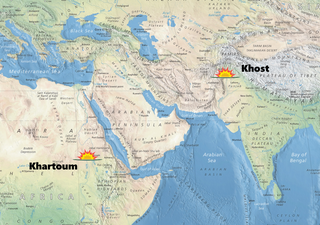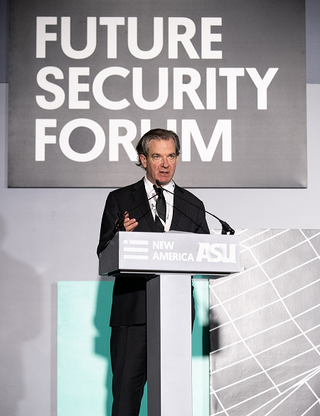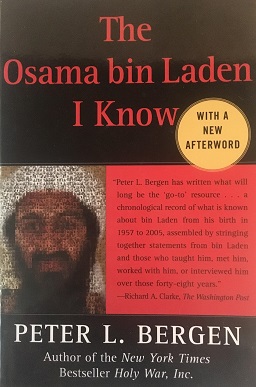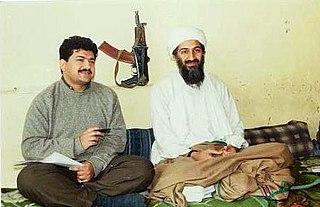
Al-Qaeda is a pan-Islamist militant organization led by Sunni Jihadists who self-identify as a vanguard spearheading a global Islamist revolution to unite the Muslim world under a supra-national Islamic caliphate. Its membership is mostly composed of Arabs, but also includes people from other ethnic groups. Al-Qaeda has mounted attacks on civilian, economic and military targets of the US and its allies; such as the 1998 US embassy bombings, the USS Cole bombing and the September 11 attacks. The organization is designated as a terrorist group by NATO, the UN Security Council, the European Union, and various countries around the world.

Osama bin Mohammed bin Awad bin Laden was a Saudi Arabian-born Islamist dissident and militant leader who was the founder and first general emir of al-Qaeda from 1988 until his death in 2011. Ideologically a pan-Islamist, he participated in the Afghan jihad against the Soviet Union and supported the activities of the Bosnian mujahideen during the Yugoslav Wars. Bin Laden is most widely known as the mastermind behind the September 11 attacks in the United States.

Operation Infinite Reach was the codename for American cruise missile strikes on al-Qaeda bases that were launched concurrently across two continents on 20 August 1998. Launched by the U.S. Navy, the strikes hit the al-Shifa pharmaceutical factory in Khartoum, Sudan, and a camp in Khost Province, Afghanistan, in retaliation for al-Qaeda's August 7 bombings of American embassies in Kenya and Tanzania, which killed 224 people and injured over 4,000 others. Operation Infinite Reach was the first time the United States acknowledged a preemptive strike against a violent non-state actor.

The Maktab al-Khidamat, also Maktab Khadamāt al-Mujāhidīn al-'Arab, also known as the Afghan Services Bureau, was founded in 1984 by Abdullah Azzam, Wa'el Hamza Julaidan, Osama bin Laden and Ayman al-Zawahiri to raise funds and recruit foreign mujahideen for the war against the Soviets in Afghanistan. MAK became the forerunner to al-Qaeda and was instrumental in creating the fundraising and recruitment network that benefited Al-Qaeda during the 1990s.
The 055 Brigade was a guerrilla organization loyal to Osama bin Laden that was sponsored and trained by Al Qaeda, and was integrated into the Taliban between 1996 and 2001.

Peter Lampert Bergen is a British and American-based United States journalist, author, and producer who is CNN's national security analyst, a vice president at New America, a professor at Arizona State University, and the host of the Audible podcast In the Room with Peter Bergen.

The Battle of Tora Bora was a military engagement that took place in the cave complex of Tora Bora, eastern Afghanistan, from November 30 – December 17, 2001, during the final stages of the United States invasion of Afghanistan. It was launched by the United States and its allies with the objective to capture or kill Osama bin Laden, the founder and leader of the militant organization al-Qaeda. Al-Qaeda and bin Laden were suspected of being responsible for the September 11 attacks three months prior. Tora Bora is located in the Spīn Ghar mountain range near the Khyber Pass. The U.S. stated that al-Qaeda had its headquarters there and that it was bin Laden's location at the time.

Operation Cyclone was the code name for the United States Central Intelligence Agency (CIA) program to arm and finance the Afghan mujahideen in Afghanistan from 1979 to 1992, prior to and during the military intervention by the USSR in support of the Democratic Republic of Afghanistan. The mujahideen were also supported by Britain's MI6, who conducted their own separate covert actions. The program leaned heavily towards supporting militant Islamic groups, including groups with jihadist ties, that were favored by the regime of Muhammad Zia-ul-Haq in neighboring Pakistan, rather than other, less ideological Afghan resistance groups that had also been fighting the Soviet-oriented Democratic Republic of Afghanistan administration since before the Soviet intervention.
The Battle of Jaji was fought during the Soviet–Afghan War between Soviet Army units, and their allies of the Democratic Republic of Afghanistan against Maktab al-Khidamat in Paktia Province. This battle occurred in May 1987, during the first stage of withdrawal of Soviet forces from Afghanistan. The objective was to relieve a besieged garrison at Ali Sher, and cut off supply lines to the Mujahideen from Pakistan. The battle is primarily known for the participation of the Arab foreign fighter and future founder of Al Qaeda, Osama bin Laden, who acquired his reputation as a divine jihadist warrior as a result of the Mujahideen victory during this battle. Bin Laden led a group of some 50 Arab foreign fighters during this battle, of which at least 13 were killed in action.

Peter Bergen's The Osama bin Laden I Know (ISBN 978-0-7432-7891-1) is a book published in 2006. It is a comprehensive collection of personal accounts by people who met Osama bin Laden or worked with him at various stages of his terrorist career.

Several sources have alleged that the Central Intelligence Agency (CIA) had ties with Osama bin Laden's faction of "Afghan Arab" fighters when it armed Mujahideen groups to fight the Soviet Union during the Soviet–Afghan War.

After the Central Intelligence Agency lost its role as the coordinator of the entire United States Intelligence Community (IC), special coordinating structures were created by each president to fit his administrative style and the perceived level of threat from terrorists during his term.
Osama bin Laden, a militant Islamist and co-founder of al-Qaeda, in conjunction with several other Islamic militant leaders, issued two fatawa – in 1996 and then again in 1998—that military personnel from the United States and allied countries until they withdraw support for Israel and withdraw military forces from Islamic countries. He was indicted in United States federal court for his alleged involvement in the 1998 U.S. embassy bombings in Dar es Salaam, Tanzania and Nairobi, Kenya, and was on the U.S. Federal Bureau of Investigation's Ten Most Wanted Fugitives list until his death.

Osama bin Laden took ideological guidance from prominent militant Islamist scholars and ideologues from the classical to contemporary eras, such as Ibn Taymiyya, Ibn al-Qayyim al-Jawziyyah, Sayyid Qutb, Nizamuddin Shamzai and Abdullah Azzam. During his middle and high school years, bin Laden was educated in Al-Thager Model School, a public school in Jeddah run by Islamist exiles of the Muslim Brotherhood; during which he was immensely influenced by pan-Islamist ideals and displayed strict religious commitment. As a teenager, bin Laden attended and led Muslim Brotherhood-run "Awakening" camps held on desert outskirts that intended to raise the youth in religious values, instil martial spirit and sought spiritual seclusion from "the corruptions" of modernity and rapidly urbanising society of the 1970s in Saudi Arabia.

The September 11 attacks were carried out by 19 hijackers of the Islamist militant organization al-Qaeda. In the 1990s, al-Qaeda leader Osama bin Laden declared a holy war against the United States, and issued two fatāwā in 1996 and 1998. In the 1996 fatwā, he quoted the Sword Verse. In both of these fatāwā, bin Laden sharply criticized the financial contributions of the American government to the Saudi royal family as well as American military intervention in the Arab world.
Since the early 1990s, several interviews of Osama bin Laden have appeared in the global media. Among these was an interview by Middle East specialist Robert Fisk. In the interviews, Bin Laden acknowledges having instigated bombings in Khobar, Saudi Arabia in 1996 and Riyadh, Saudi Arabia in 2003, but denies involvement with both the 1993 and 2001 attacks on the WTC towers in New York City.
The 1992 Aden hotel bombings were two terrorist bomb attacks carried out by al-Qaeda on December 29, 1992, that were intended to kill United States Marines in Aden, Yemen. It is considered to be the first attack on the United States by Al-Qaeda, though the objective was mostly unsuccessful.
The following is an outline of the series of events that led up the War in Afghanistan (2001–2021).
al-Qaeda has five distinct phases in its development: its beginnings in the late 1980s, a "wilderness" period in 1990–1996, its "heyday" in 1996–2001, a network period from 2001 to 2005, and a period of fragmentation from 2005 to 2009.











